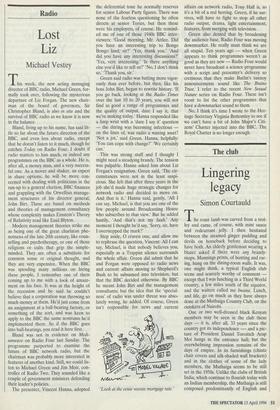The club
Lingering legacy
Simon Courtauld
One or two well-dressed black Kenyan members may be seen in the club these days — it is, after all, 33 years since the country got its independence — and a pic- ture of President Daniel Toroitich Arap Moi hangs in the entrance hall; but the overwhelming impression remains of the days of empire. In its furnishings (chintz chair covers and silk-shaded wall brackets) and in the clothes of some of the lady members, the Muthaiga seems to be still set in the 1950s. Unlike the clubs of British India, which continue to flourish today with an Indian membership, the Muthaiga is still composed predominantly of English and white Kenyan members. The noticeboard announced the lottery numbers from Britain and the result of a sweepstake on the Grand National.
Another notice regretted that atten- dances at dinner had fallen recently due to the 'security situation'. Nairobbery, as the city is often called, has an appalling record of muggings — a British diplomat who was shot last November by thieves trying to steal his Land Rover died last month and members are understandably reluctant to be out at night. In this haven of peace and old-fashioned order, however, one is blissfully insulated from thoughts of violent crime, not to mention the disturbing statis- tic that two-thirds of Kenya's population is under 25.
There are silver golf and tennis cups dis- played in a glass cabinet, English newspa- pers and a backgammon board, and a bar menu which includes Scotch eggs and ploughman's lunch. No cash transactions are permitted — chits with everything and gentlemen are requested to wear a jacket and tie in the evenings. A framed map of the Muthaiga estate, which dates from the founding of the club shortly before the first world war, marks 'hand- some houses where the wealthy nobles dwell' in 'His Majesty's Forest Demesne'. In the bar reserved for men only there hang pencil portraits by Ray Nestor of some of Kenya's early settlers — Lord Delamere, Ewart Grogan, Berkeley Cole — and, I was amused to find, a copy of Nestor's obituary in the Daily Telegraph (written by myself).
For a visitor to the Muthaiga Club, it is names such as these which still give the place its fascination. The famous, and famously promiscuous, aviatrix of 1930s Kenya, Beryl Markham, wrote of the club:
District Commissioners — leather-brown, the drone of some frontier wind still singing in their ears, their minds free for a while from deserts and decisions, black men's ways and white men's edicts — found solace at Muthaiga. Lion, elephant and buffalo some dead a day, some dead for years were revived again and shot again in copses of Wedgwood saucers, behind hillocks of table linen, or in jungles of swizzle sticks.
But the killing of big game was as noth- ing, in the annals of the Muthaiga, com- pared to the shooting of a member of the club committee, the Earl of Erroll, in the early hours of 24 January 1941. Sir 'Jock' Delves Broughton, having been tried for Erroll's murder and acquitted, was asked to resign from the Muthaiga after he gave a party there to celebrate his freedom.
Students of the White Mischief affair will recall that on the evening of the murder Delves Broughton and Erroll dined togeth- er at the club with Delves Broughton's wife, Diana, who was having an affair with Erroll. (They had met at the Muthaiga, a few weeks earlier.) Walking through the central hall, pillared and chandeliered, and into the dining-room, I found myself won- dering where the party had had their cham- pagne cocktails on that fateful evening and at which table they had sat when Delves Broughton bizarrely proposed a toast to Diana's and Erroll's future together.
Engraved in the chimney-piece above the fireplace in the reading room is the club's motto, in Swahili, `Nakupa hati nzuri' — 'I bring you good fortune'. For Erroll, who had been the leading light of the Happy Valley set in the inter-war years and a notorious seducer of other people's wives, the fortune was to be short-lived. `fle really needed killing,' a character from those days once said to me. The game was up, too, for Delves Broughton, who returned to Eng- land and, possibly because he was about to face charges for insurance fraud, commit- ted suicide in Liverpool. Diana, 'the creamy ash-blonde from Hove', was the survivor, marrying Gilbert Colvile, who was known as the richest and most boring man in Kenya, and afterwards Lord Delamere, son of the pioneer settler. She stayed on in Kenya, continuing to use the Muthaiga club when she was in Nairobi, and died in 1987.
Today's Muthaiga members may not be as aristocratic or racy as they once were, but one may suppose that they indulge in their fair share of adulterous behaviour. At least, from the evidence of the club's library, they enjoy reading about it: a Danielle Steel novel had been taken out 25 times in the past ten months, and I found a well-thumbed volume entitled The English Gentleman's Mistress.
There was talk at the Muthaiga last week of a new book being written about the Erroll affair, which may ascribe a political motive to his murder. Confirming their long-held suspicions, a number of club members would not be unhappy if Diana Delamere were to be implicated in the murder.
Down at the coast, at the weekend, I heard that a deep-sea fishing competition off Kilifi had been won with a catch of two 200-pound black marlin from a boat called White Bear. 'That was Lady Delamere's boat,' a waiter told me respectfully. It is good to know that the legacy lingers on.
`Come on Rapunzel — I know you're in there.'



































































 Previous page
Previous page